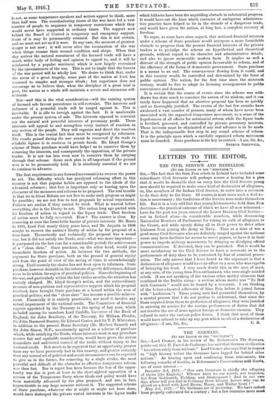LETTERS TO THE EDITOR.
THE CIVIL SERVICE AND REBELLION.
[To THE EDITOR OF THE " SPECTATOR.1 Srn,—The fact that the Sinn Fein rebels in Ireland have included some subordinate Civil Servants will perhaps • secure a hearing for a plea that it would be desirable that on entry into the Civil Service young men should be required to make some kind of declaration of allegiance, or, like members of the Indian Civil Service, to enter into a covenant to do their duty to the State. Of course, in most cases such a declara- tion is unnecessary : the traditions of the Service soon make themselves felt. But it is a very odd fact that young Irishmen who hold Sinn Fe:n doctrines—the practical outcome of which we have all now witnessed.— have for the past ten years entered the Lower Division Civil Service— not in Ireland alone—in considerable numbers, while denouncing Nationalist Members of Parliament for taking an oath of allegianCe is the Crown, and while openly doing all in their power to deter other Irishmen from joining the Army or Navy. Thus at a time of war a good many Civil Servants who are definitely ranged against the national cause may have facilities for access to secret papers, or have it in their power to impede military movements by delaying or divulging official communications. If detected, they can be punished. But it would be more satisfactory to the Civil Service to have a covenant as to the performance of duty than to be restrained by fear of criminal prosec- ution. The only answer that I have heard to the argument is that a declaration of allegiance would have no effect on a man who was capable of betraying his trust. I very much doubt this in the case of most, at any rate, of the young Sinn Fein enthusiasts, who were single-minded rebels. (I am not speaking of the various other motley elements that combined in the Dublin rising : a section whose motto was " To Hell with Contracts " would not be bound by a covenant. I am thinking of the better-educated adherents of Sinn Fein before it joined forces with " Larkinism.") These young men had persuaded themselves, by a mental process that I do not profess to understand, that since the State required from them no profession of allegiance, they were justified in entering its service for the routine performance of duties that did not involve the use of arms against foreign or domestic enemies. They refused to enter the various police forces. I think that most of them would have refused to take up any post which involved a declaration of






























 Previous page
Previous page